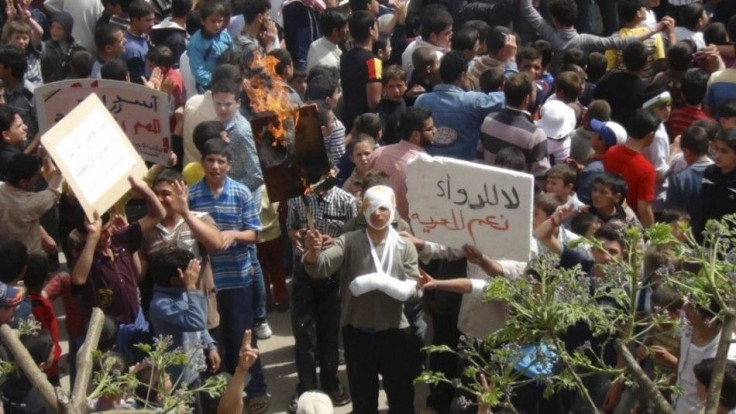Violence Persists In Syria As Annan Appeals To Both Sides To Honor Truce

(Reuters) -- Syrian soldiers stormed a town east of Damascus on Sunday and rebels bombed a military convoy in the north of the country as international mediator Kofi Annan urged both sides to work with an expanded team of U.N. ceasefire monitors.
The group of unarmed military monitors has been operating in Syria for a week, overseeing a 10-day-old truce agreement that has curbed some of the violence but failed to bring a complete halt to 13 months of bloodshed.
The U.N. Security Council agreed on Saturday to expand the mission to a 300-strong observer team, part of Annan's plan to halt the killing and launch a political dialogue between President Bashar al-Assad and opponents seeking his downfall.
Annan said the council's decision was a pivotal moment in the stabilization of the country after more than a year of turmoil in which more than 9,000 people have been killed.
The former U.N. secretary-general called on both Syrian government forces and opposition fighters to put down their weapons and consolidate the ceasefire accord.
The government in particular must desist from the use of heavy weapons and, as it has committed, withdraw such weapons and armed units from population centers, Annan said.
Assad's opponents say his forces have continued shelling opposition strongholds in violation of the truce, while authorities say terrorist armed groups have kept up a campaign of bombings against government targets.
Opposition activists said security forces killed at least six people on Sunday. Soldiers backed by tanks charged into the town of Douma, east of Damascus, while security forces opened fire in the northern province of Idlib, they said.
Internet video footage which activists said was filmed in Douma on Sunday showed grey smoke rising from buildings and the sound of heavy gunfire in the background. One clip showed soldiers in helmets and bullet-proof vests next to a tank.
The British-based Syrian Observatory for Human Rights said that at least four soldiers were killed when a bomb hit an armored personnel carrier outside Douma.
The official news agency SANA made no mention of fighting in Douma but said that at least one officer was killed by a bomb which struck a convoy of army officers and cadets in the northern province of Aleppo. Another bomb targeted a freight train transporting flour in Idlib province, it said.
OBSERVER MISSION
U.N. observers toured the central city of Homs on Saturday, bringing a degree of calm to the rebel stronghold which has endured weeks of shelling by the army. Two observers stayed overnight in the city, a U.N. spokesman said.
Activists in Hama, north of Homs, said they expected the monitors to visit their city on Sunday.
Hama, where Assad's father crushed an armed Islamist uprising 30 years ago, killing many thousands of people, has been quieter since the ceasefire came into effect, according to a local activist who identified himself as Musab.
We don't see the tanks any more, they just hide them in government installations, he said. But the troops are still around. The truce has an effect but not to the extent that we can demonstrate freely.
Western and Arab ministers meeting in Paris last week described the observer mission as a last chance for peace in Syria. The United States said that if Damascus did not permit an adequate monitoring process, the Security Council should work towards imposing sanctions on Syria.
On Saturday the Security Council unanimously adopted a Russian- and European-drafted resolution authorizing an initial deployment of up to 300 unarmed military observers to Syria for three months, a mission to be known as UNSMIS. {ID:nL6E8FL01H]
The resolution said that deployment of the mission would depend on an assessment by Secretary-General Ban Ki-moon about compliance with Annan's six-point peace deal. Ban will report to the council every 15 days.
The resolution also noted that the cessation of violence by the government and opposition is clearly incomplete and warned that the council could consider further steps in the event of non-compliance with its terms. It urged Syria to quickly agree with the United Nations on the observers' use of appropriate air transportation assets, which Damascus has yet to accept.
The United States, Britain and France all made clear they would want any further steps by the council to be sanctions.
Western powers have little appetite for a Libya-style military intervention to topple Assad's government because of its much stronger armed forces and the risk of wider regional conflict drawing in powerful allies of Damascus such as Iran and Hezbollah militants in neighboring Lebanon.
Annan said the work of the mission should help create the conditions conducive to launching the much-needed political process, which would address the legitimate concerns and aspirations of the Syrian people.
I call on the government and the opposition and all the people of Syria to prepare to engage in such a process as a matter of utmost priority, he added.
(Additional reporting by Stephanie Nebehay in Geneva, Louis Charbonneau and Michel Nicols at the United Nations; Editing by Mark Heinrich)
© Copyright Thomson Reuters 2024. All rights reserved.





















